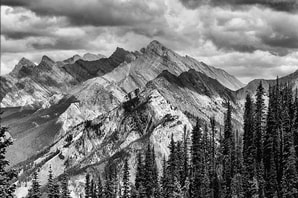
There is no question that the wilderness is essential to our Biblical story. At least 300 times in the scriptures the wilderness is referred to as a place where God can be heard and encountered. We have only to think of the stories of Moses and the burning bush, or of Hagar sent out into the wilderness to die, or of John the Baptist emerging from the wilderness with a message of repentance, to recognise the centrality of the motifs of the wilderness as a place simultaneously of refuge and of challenge. Some go to the wilderness to escape their pursuers. Others find in the wilderness a place of testing and endurance.
A twentieth century commentator, addressing the American lawmakers about the need to preserve wilderness places for future generations, remarked that while the people of Israel had wandered in the wilderness for forty years, future generations might be wandering forty years before they could find a wilderness, such is the expansion of urban sprawl and the destruction of wild places in recent decades. Yet the call of wild places to our spirit remains and people returning from wild places speak from a common dictionary. They talk about re-establishing connection with themselves and God; heightening their awareness of the transcendent; sharpening their sense of compassion towards the natural order and increasing their sense of reverence. These are values that we preference and that it seems that God preferences too.
Just as God has a clear preference for the poor, it seems that God prefers to encounter us in the wilderness, whether that wilderness be physical, emotional, spiritual or all three. It is easy to see why. In the wilderness there is simply less to distract us. Human made noise ebbs away; human driven distractions like phones and computers can be set aside; the clamour of human assumed competence is stilled. There is the possibility of a silence where God can speak and be heard. “In the wilderness everything becomes 110% what it is, without all the usual background noise and distraction, there is nothing to dilute reality.”1
Now of course we cannot all simply up sticks and head off to the wilderness for a month or a year – especially not in the current crisis. But what we can do is seek some of the things that belong to that experience in other places – silence, solitude, an intentional letting go of the trappings of modern life, in order to be available for two minutes or two hours to the voice of God. We can seek our own inner wilderness places.For wilderness, as Jesus found, is essential to our spiritual maturing. Whether that wilderness be physical or metaphorical, places that ignore us, force us beyond the cries of ego and so indeed, save us in the end. In the name of the one who calls to us in the wildernesses of our lives and world. Amen.
by Penny Jones, for Outback/Wilderness Sunday, 20 September 2020
1. BB Taylor “Four Stops In the Wilderness” Journal for Preachers 2001
 RSS Feed
RSS Feed